|
|
Post by Antonio on Jan 24, 2023 23:03:43 GMT 12
28th Māori Battalion Battle Honours memorial flag to fly in Rotorua for Waitangi Day From RNZ: www.rnz.co.nz/news/national/483036/28th-maori-battalion-battle-honours-memorial-flag-to-fly-in-rotorua-for-waitangi-day 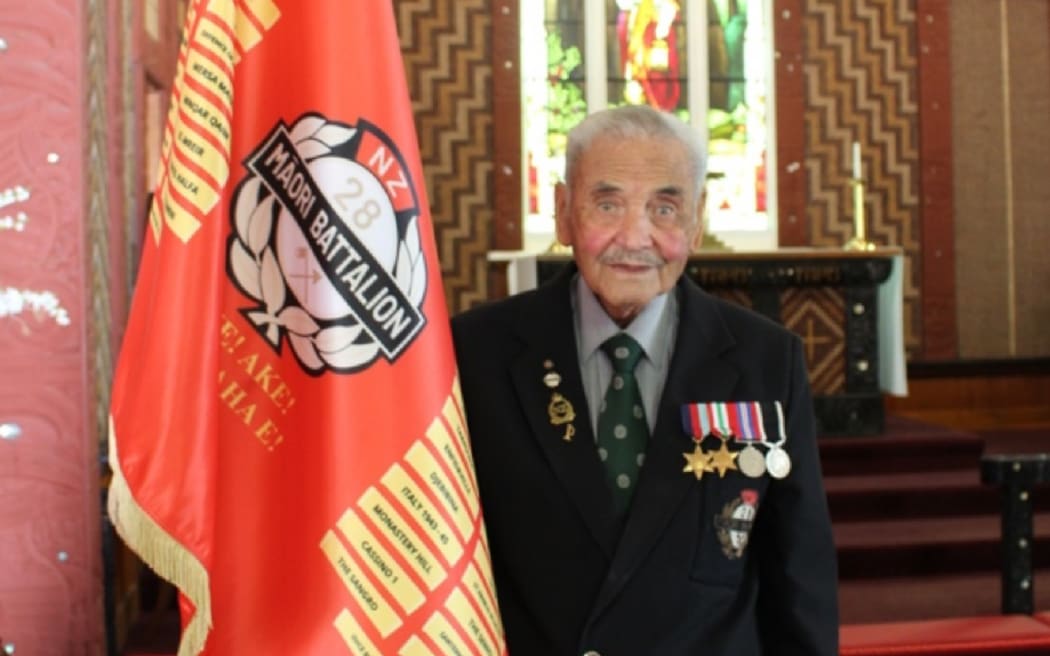 Tā Robert Gillies Kamupene B, 28 (Māori) Battalion stands with Aake Ake Kia Kaha, The 28 (Māori) Battalion Battle Honours Memorial Flag at St Faiths, Ohinemutu. Photo: Harawira Craig Pearless / Supplied Tā Robert Gillies Kamupene B, 28 (Māori) Battalion stands with Aake Ake Kia Kaha, The 28 (Māori) Battalion Battle Honours Memorial Flag at St Faiths, Ohinemutu. Photo: Harawira Craig Pearless / SuppliedFor the first time in 76 years, the 28th Māori Battalion Battle Honours memorial flag will be fully displayed and recognised in Rotorua for Waitangi Day. It will be presented at Muruika, Ohinemutu on 6 February by Tā Robert Gillies, the last remaining member of the 28th Māori Battalion who served in B Company during World War II from 1942-1945. Last year he was knighted for a second time after previously turning it down twice, accepting it on behalf of the soldiers he fought alongside. The Battalion's 42 Campaign and Battle Honours will acknowledge the sovereign which recognises their presence, since the campaign and battle honours have never been displayed. Tā Robert says recognition of the campaign is 70 years too late. "We were volunteers, not conscripts, and we fought for six long years. The whole battalion agrees." More than 3600 young Māori were part of the 28th Māori Battalion. More than 600 of them were killed during the war. For years, Tā Robert has called for the Crown to apologise for the treatment of Māori soldiers after their return. Despite the huge sacrifices these soldiers made, when they returned to New Zealand very little was changed in terms of policy and equality for Māori. Soldiers who fought in the battalion weren't allowed to enter RSAs, hotels and other public places, and were told to leave. More than 600 soldiers who fought in the battalion never received their medals either. 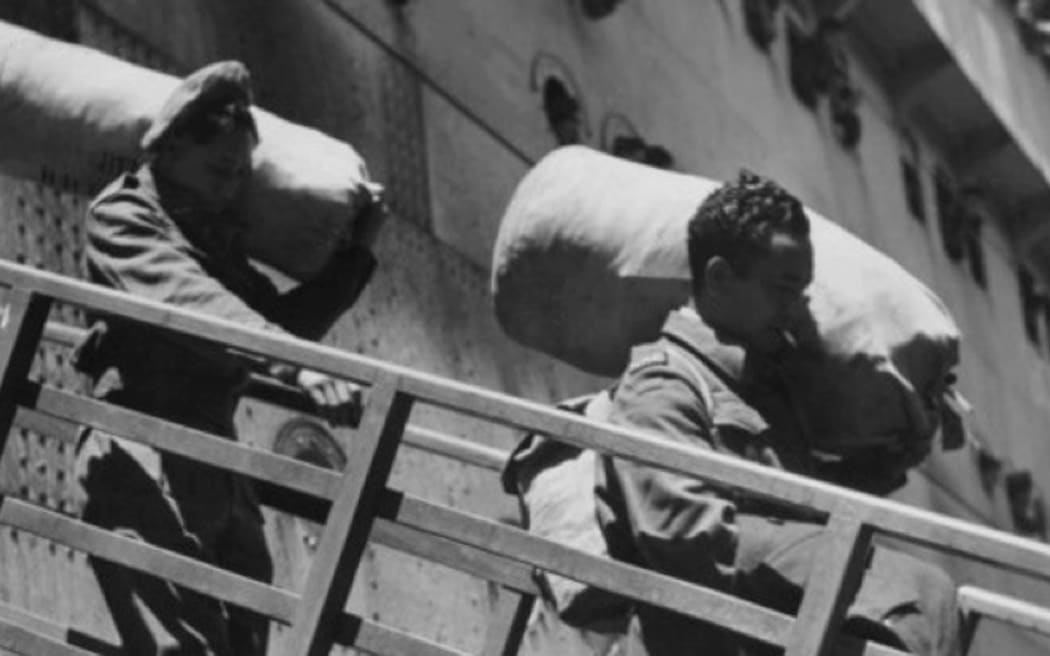 Members of the 28th Māori Battalion return home in 1946 Photo: Supplied Members of the 28th Māori Battalion return home in 1946 Photo: SuppliedTā Robert has been fighting another battle of his own, trying to get recognition for the battalion by representing it at events across Aotearoa. Lawyer David Stone is also working to help retrieve the medals of those soldiers who never received them. In December, a ceremony was held in Ohinemutu where the whānau of 89 soldiers were finally awarded their medals at Te Papaiōuru Marae in Rotorua. Tā Robert wants the New Zealand Defence Force Māori Battalion flag and the 28th Māori Battalion Battle Honours Memorial to stand next to each other as pou maumahara (memorial carving), to highlight the sacrifices tangata whenua made during World War II. Tā Robert will also present the flag at Waitangi on 18 February, where a kawe mate (mourning ceremony) will take place before returning to the Taonga Tūpāpaku to Waitangi on Anzac Day 2023. |
|
|
|
Post by Dave Homewood on Jan 24, 2023 23:41:05 GMT 12
Tā Robert has been fighting another battle of his own, trying to get recognition for the battalion by representing it at events across Aotearoa. Good on him and all, however for the past 30 or 40 years 28 (Maori) Battalion seems to have been the only one of our fourteen infantry battalions that served overseas, not to mention the countless battalions that served at home in NZ's defence, and all the other Army units that supported the battalions, that ever gets recognised. They always get all the press, even in stories where other battalions had a much more prominent role. It's also a sad fact that funding has long been much more forthcoming for this unit to gain publicity and have reunions, etc, than any other military unit that served in the NZ Armed Forces in WWII, which has helped to maintain 28's high profile. |
|
|
|
Post by noooby on Jan 25, 2023 6:36:08 GMT 12
Seriously Dave?
You mean the one Battalion that was discriminated against while fighting and after their return home, shouldn't keep arguing the point? They should just fade into the background?
That's a disappointing attitude to racial discrimination within the military in New Zealand.
Perhaps they "get the Press" because they are STILL being discriminated against and still haven't had the situation resolved? They're not asking for any more than others received. Just fair treatment.
You seem to have a problem with that, or at least with them being vocal about it.
You've totally missed the point.
Disappointing.
|
|
|
|
Post by Dave Homewood on Jan 25, 2023 7:21:40 GMT 12
What the hell are you on about?
They were not discriminated against, other than initially right at the beginning of the war the Labour Government decided that because so many Maori had died during the flu epidemic that they should not go to war as a large loss of their young men would would be devastating to the race. They were trying to protect them.
It was the Maori MPs and leaders who argued this and convinced the government to allow them to go to war. It was them, the Maori leaders, that insisted they form their own unit along racial lines, set up like the Maori Pioneer Battalion of WWI. It was not a discrimination and segregation by white men, this separate unit was at the insistence of Maoridom. It was set up along tribal lines, each Company represented by a major tribal group, as a means to instill a pride and rivalry without the inevitable infighting had everyone just been mixed up.
I have met a good number of 28 (Maori) Battalion veterans and I interviewed a number of them. That includes at the time the President of their association. We talked about race relations and there was no tensions between 28 and the other battalions. By the way a number of tribes refused to allow their men to join 28, including Tainui, so if individuals wanted to join up form the tribal regions outside of the four tribal regions that 28 was divided into, then they joined other battalions, and a good number of them also served in the New Zealand Engineers. So there was no segregation of the Maori from other units, as you seem to assume. There were also the occasional white soldier in 28 Battalion too. One officer I met said his sergeant was a ginger headed Scottish Kiwi who had ended up in 28 somehow.
I have also interviewed a lot of men from other battalions, especially 21 and 24 among others, who both saw some heavy fighting. And a good number of them stated how disappointing it was that they'd been forgotten, and that whenever anything was on the TV or radio about the 2NZEF it focused on 28 Battalion alone. The other units got no look in. This is almost true, looking back at the stuff on the 2NZEF from the 1980's onwards 28 was most definitely over-represented. And I am still yet to see anything on TV focusing on one of the three battalions in the Pacific, other than the wee smatterings of interviews in the series New Zealanders At War (1995).
And as for after the war, that president of the association said that the one thing that felt like they were being discriminated against was how most of the people he'd served with were turned down for a farm or house loan in the ballot. I am not sure whether or not is was a policy to turn down Maori as he suggested, but the rejection for loans was not exclusive. My good fried Colin Murray of 24 Battalion was also disappointed to be turned down and he was not Maori at all.
28 Battalion were brave and did their bit, but were in the same battles as all the other 2NZEF battalions. Take Cassino, the only thing that usually gets a mention is the failure by 28 Battalion to hold the railways station in the second battle. They never mention the other NZ battalions and the NZ Engineers also involved in that battle, only the failure and deaths which turned the battle against the Allies.
The media makes them out to be super soldiers now but they were no better and any others in the Division and their death rates showed them to be the least successful. A number of the veterans I met have mentioned that 28 Battalion had a culture of making lots of noise as they went into battle, even when the order had been given to go silently, which often led to casualties - and not just for 28 Battn. It used to piss off the other battalions.
In Roger Smith's book Up The Blue he wrote about witnessing 28 Bttn members throwing away their lives needlessly by using rip shit and bust tactics rather than the standard taught doctrine, and veterans have also mentioned that to me.
And C Company of 28 were also murdering prisoners in Italy, on the order of their company Commander Pita Awatere, who was later convicted of murder and died in prison.
The battalion was proud of their thieving and scams, all the veterans I met talked about how they were the best thieves in the NZ Army. And how they all had scams going to con the Italians or other Allies.
There is so much more to the story than the general public has been shown, but there is definitely far more to the story of all the other battalions too as their stories just don't get covered.
I am not sure where you get the notion that they were discriminated against, but I never heard anything other than the house loans thing from the veterans I met and interviewed,and I am not sure if that was even policy of coincidence.
|
|
|
|
Post by shorty on Jan 25, 2023 17:46:00 GMT 12
I' m with Dave on this, the media has a fixation on 28 Battalion and ignore the rest of the armed forces sacrifices. that is an insult to those who made the ultimate sacrifice to protect our ideals
|
|
|
|
Post by Antonio on Jan 25, 2023 23:29:14 GMT 12
Don't get me wrong about my posting the article here,
if it had been, say, the 22nd Battalion, I would have posted that too.
|
|
|
|
Post by Dave Homewood on Jan 26, 2023 8:34:36 GMT 12
Not at all Antonio. I have nothing against 28 Battalion, and all the guys from it I met I really liked and respect. It was just that comment about them not being recognised that rankled. They are THE most recognised, and if anything, the most over-exposed military unit in NZ history.
|
|
|
|
Post by Antonio on Jan 26, 2023 10:08:06 GMT 12
Not at all Antonio. I have nothing against 28 Battalion, and all the guys from it I met I really liked and respect. It was just that comment about them not being recognised that rankled. They are THE most recognised, and if anything, the most over-exposed military unit in NZ history. Agreed |
|
|
|
Post by Antonio on Feb 7, 2023 9:02:50 GMT 12
To follow on: 28 Māori Battalion flag raised with full honours for the first time Link: www.rnz.co.nz/news/national/483745/28-maori-battalion-flag-raised-with-full-honours-for-the-first-time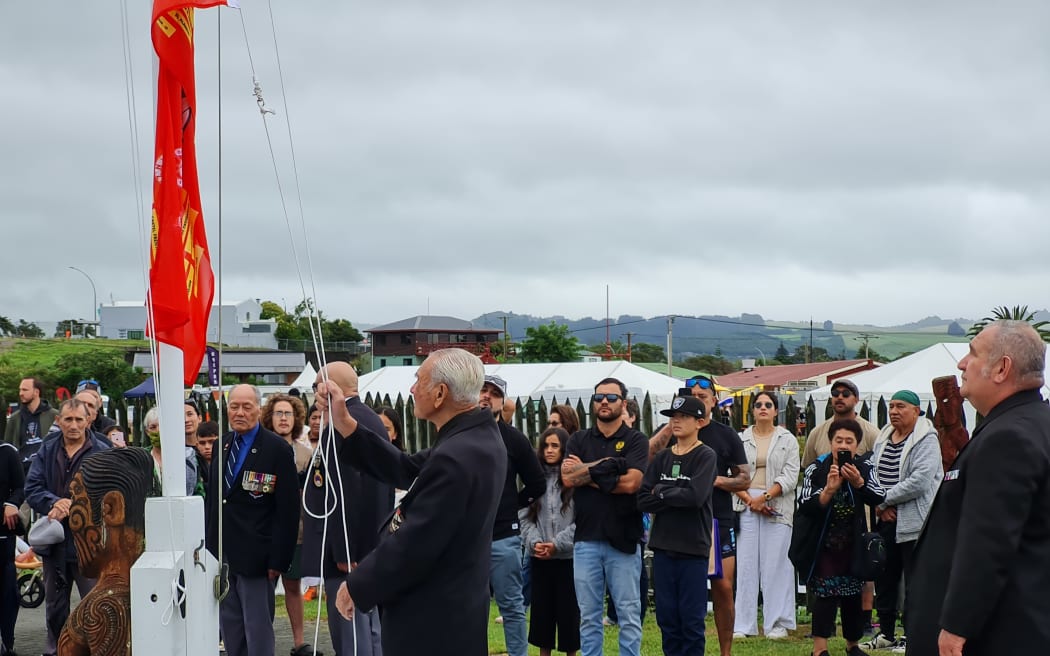 The 28 Māori Battalion flag was raised for the first time with the full honours during a ceremony at Ōhinemutu, on the shores of Lake Rotorua. The 28 Māori Battalion flag was raised for the first time with the full honours during a ceremony at Ōhinemutu, on the shores of Lake Rotorua.
Photo: RNZ/ Pokere PaewaiFor the first time ever a flag bearing the full battle honours of the 28 Māori Battalion has been publicly displayed. The award of 42 Campaign and Battle Honours was presented by the New Zealand Army, to be recognised for the first time in 76 years. The formal award meant the battalion could now display its battle and military traditions. And the flag bearing the honours was raised this morning by the last remaining member of the battalion, Tā Robert 'Bom' Gillies at Ōhinemutu, on the shores of Lake Rotorua. 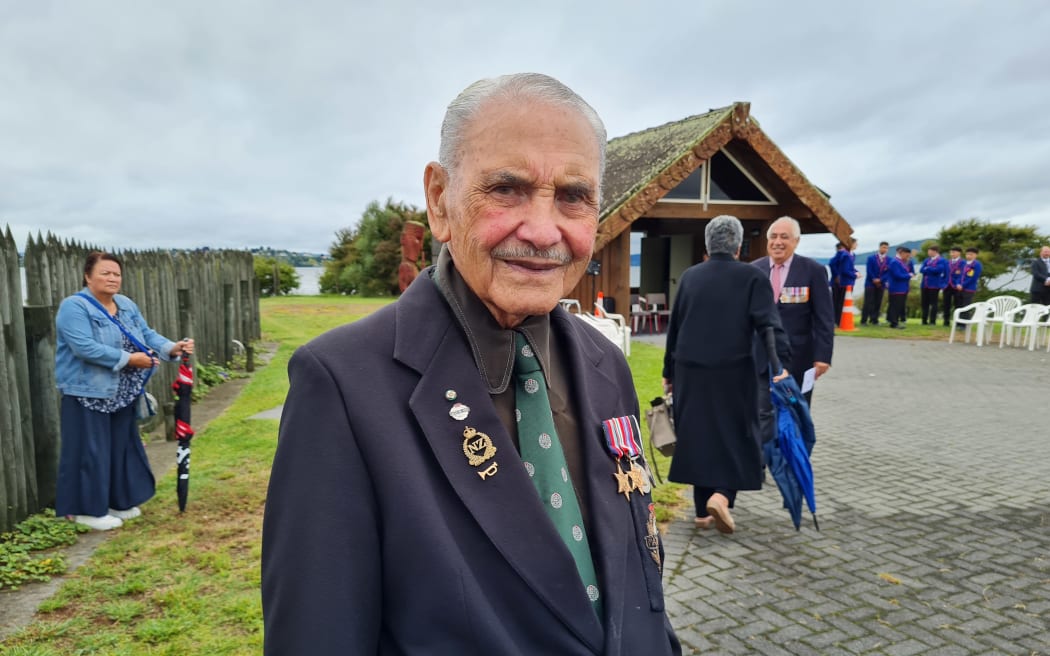 Tā Robert 'Bom' Gillies Photo: RNZ/ Pokere Paewai Tā Robert 'Bom' Gillies Photo: RNZ/ Pokere Paewai"It's a pity they waited so long and all my comrades are all passed on. I happen to be fortunate enough to be the last one, so in honour of them it'll be great," Sir Robert said. The flag was commissioned by historian Dr Harawira Pearless on behalf of Sir Robert, and was named 'Ake Ake Kia Kaha,' after the motto of the Māori Battalion. 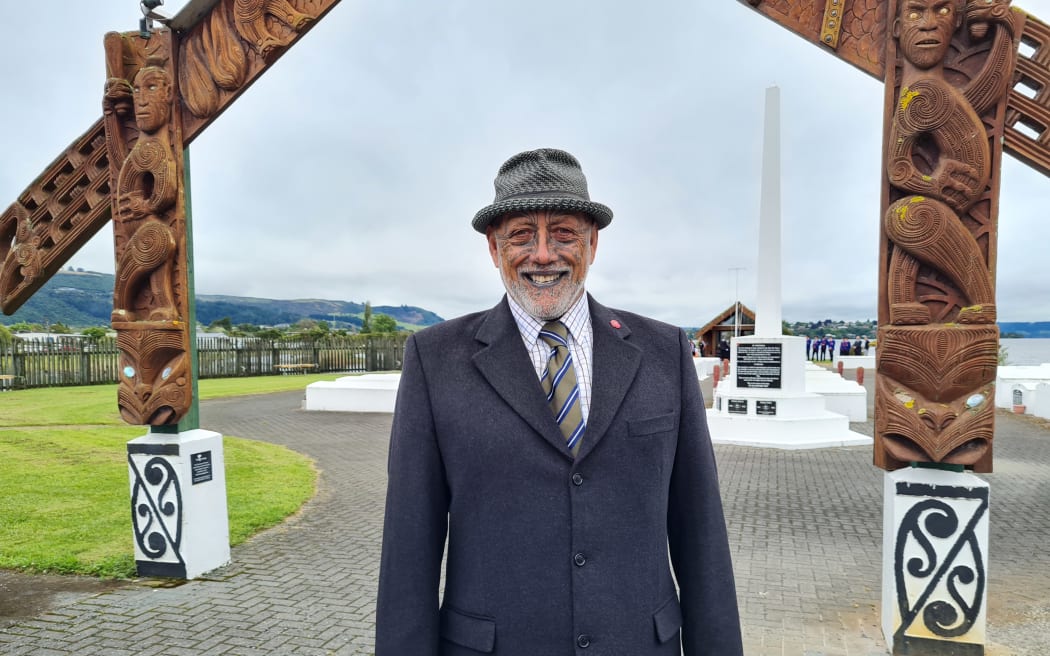 Historian Dr Harawira Pearless Photo: RNZ/ Pokere Paewai Historian Dr Harawira Pearless Photo: RNZ/ Pokere PaewaiPearless said battle honours on the flag commemorated the battles and burial grounds of the battalion. "The 28 Māori Battalion Campaign and Battle Honours flag is the pā whakawairua, it's the anchor stone of 28 Māori Battalion's military traditions and histories. "It has not been seen before with all 42 Campaign and Battle Honours on display," he said. Pearless said Sir Robert was the only person with the mana to raise the flag. "Tā Bom Gillies is the representation of the battalion. "There were 3500 men that went, there were 650 men who never came home. He carries the rangatiratanga of the battalion as we know it today," he said. 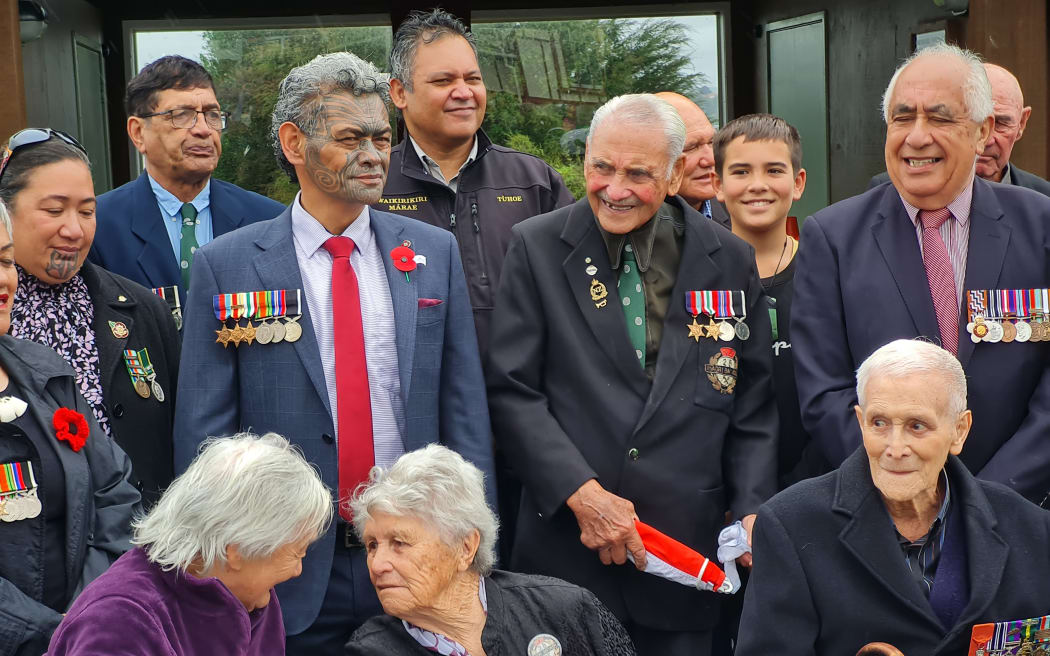 The ceremony today, at Ōhinemutu Photo: RNZ/ Pokere Paewai The ceremony today, at Ōhinemutu Photo: RNZ/ Pokere PaewaiSir Robert was humble about his part in the battalion's story, and initially had refused to accept a knighthood. "That doesn't belong to me. It belongs to the 3500 plus men who served in the battalion - in all the battalion's campaigns, which we've put on the flag," he said. But he was happy to see the battalion finally receive this recognition. "I have no idea why [the crown] dragged the chain. But apart from that, today is the day when it all settled." Originally the plan was to present the flag at Waitangi today, but Sir Robert's whānau had asked for the ceremony to happen closer to home. Sir Robert would also present the flag at Waitangi on 18 February. |
|












